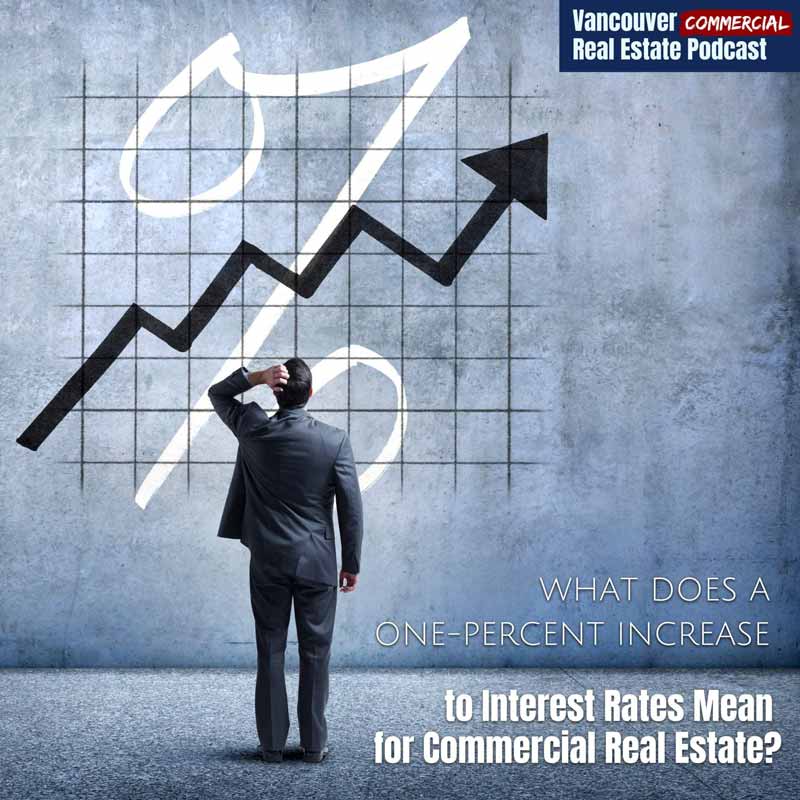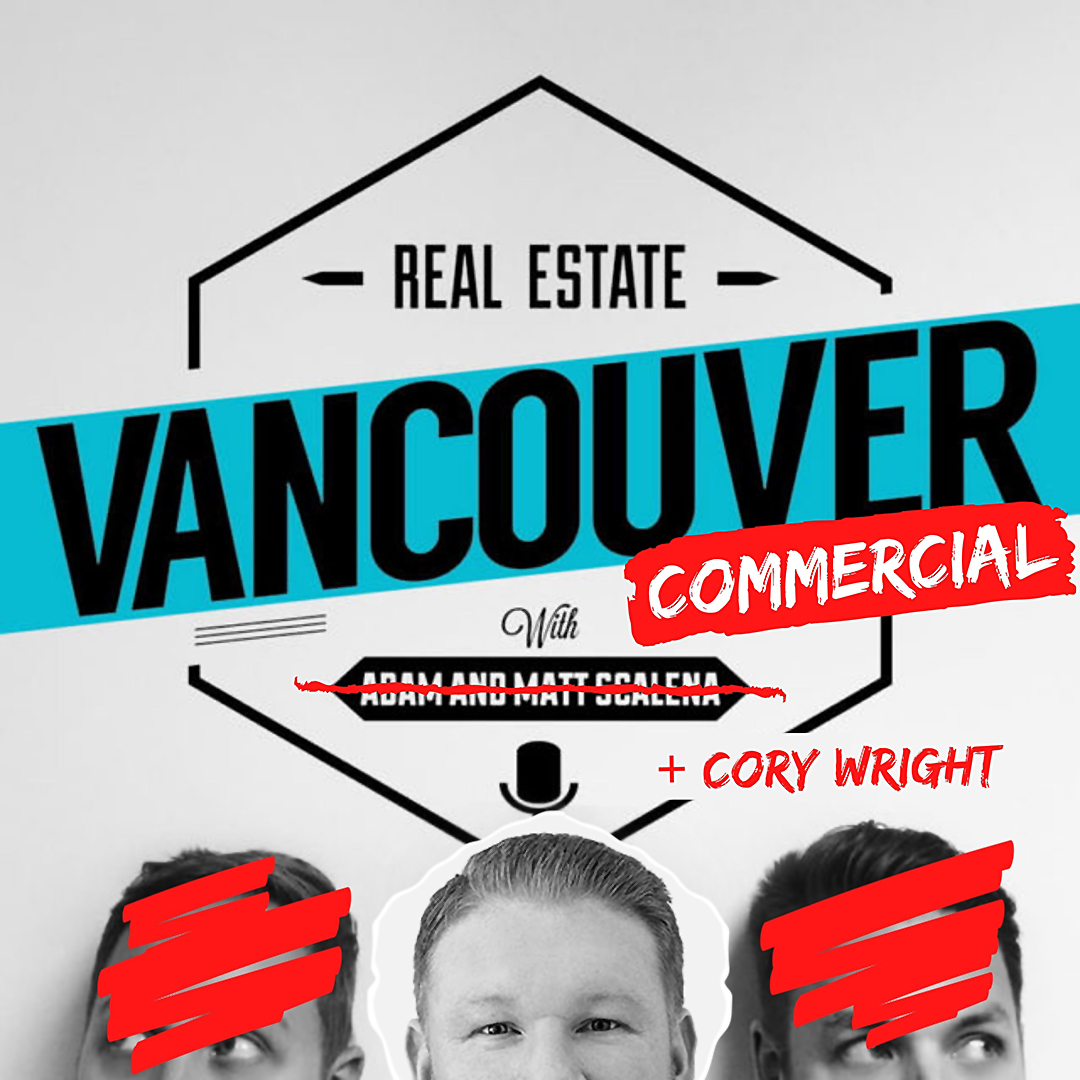
Powered by RedCircle
If you were shocked by the Bank of Canada's one-percent increase to interest rates this past week, you're not alone.
Cory and Matt are here this week to discuss the potential impact on commercial real estate... if any all. How does this affect your loan-to-value ratio when looking to acquire real estate? And what's next for the commercial real estate market in the province?
As we continue down a path of unprecedented times, we unpack and shed some light on what we anticipate will happen and how that will be reflected in your decision making moving forward, as interest rates will continue to increase through 2022 and into 2023.
The Bank of Canada recently came out with a 100 basis point increase to the overnight rate, shocking many Canadians. Now we’re left wondering why they did it and what’s next.
What does the recent interest rate increase by the Bank of Canada mean for the commercial real estate market?
An increase in the interest rate obviously has an effect on the commercial real estate market because the cost of debt is a lot more. But that’s coming from historically low interest rates.
Pre-pandemic, many commercial interest rates were in the mid 4s or mid 5s. Throughout the pandemic, we came down to record lows with people getting rates of 2.5% on commercial real estate. No one expected interest rates to spike as fast as they have, so this is a shock. It may have a dramatic effect on pricing for both commercial and residential real estate.
In commercial real estate, people who don’t have to sell probably won’t. Things may slow down and sellers may not get the prices they’re expecting, but I don’t think this is catastrophic for our market.
What are current interest rates like in commercial real estate?
Interest rates in commercial real estate are generally 1-1.5% higher than rates on the residential side. Currently, rates in commercial are around 5.5-6% with Schedule I banks and credit unions. The private market is probably closer to 9-10%. Rates are slightly higher now than they were pre-pandemic but the major concerns are how fast they’ve risen and how far they’ll go.
I expect banks will tighten up internally and de-risk all loans. I’ve heard rumours that some of the banks are stress-testing commercial loans in-house at 9-10%. They don’t want to be putting up any money that borrowers can’t repay. This is similar to what we saw at the beginning of covid when banks were pen downs because they didn’t know what was happening.
When we talk about a property’s ability to debt-service, the lower the cap rate, the less money a borrower has to make their payments. So with higher interest rates, the loan to value ratio will change dramatically.
Based on my cap rate, a bank is going to apply a debt servicing ratio to me – the spread between what is coming in and what they’re willing to loan. They’ll also consider the vacancy rate.
Will higher interest rates change how much people have to put down?
The difference with commercial real estate is the lending is based on the tenancy, not just the borrower like in residential real estate. It’s about the money coming into the property more than it’s about the individual buying the property.
Even if interest rates rise, lease rates don’t. To make the numbers work, borrowers have to put more money down, which gives them a smaller loan to value.
In a higher interest rate environment, borrowers have to put more money down. If your previous loan to value was 75% – meaning the bank will lend you 75% of the value and you need to put up the other 25% – it now might be 65%, meaning you need to put up 35%.
Do higher interest rates impact who is buying commercial real estate?
Leverage is the trick to real estate. If you have $100,000 as a down payment, you might have been able to buy a $400,000 property before. But now that interest rates have gone up and your loan to value ratio from the bank has gone down, you might only be able to buy something for $300,000.
In high interest rate environments, smaller price brackets tend to get busier or people decide to stay on the sidelines and see what happens. Once people realize the world isn’t over, they might get back into the market.
In BC, there are always more offers than land available. We’re one of the best areas in the world during a real estate slow down.
Strengths and weaknesses by commercial asset class:
Industrial continues to buck the trend because demand outweighs supply by a landslide. Things might take longer and there may be a price reduction or two, but industrial real estate will lead us out of this.
Retail has dealt with the brunt of the challenges during covid. But in my opinion, retail is your best opportunity. They took the hardest hit and now we’re seeing the bounceback. So you might be able to pick up a good retail asset at a cheaper price as it’s beginning to trend upward.
We like the Vancouver Island and BC Interior markets for retail, mostly because of the great cap rates and how liveable cities like Victoria and Kelowna are. You have to find stuff on the outskirts of where it’s all happening. Buy on the fringe, such as in the Harris-Green district in Victoria. That will be the Yaletown of Victoria in the next 10 years. Get into markets that are emerging with higher than average population growth.
Where are the opportunities in retail in the Lower Mainland?
Pre-pandemic, the cap rate in Vancouver was 3-3.5%, it was 5% in Chilliwack and it was 6% in Kelowna. In the height of the pandemic, everything in the Lower Mainland levelled out to about 3.5%. Vancouver was still at a premium, but there wasn’t a huge change to go out to Maple Ridge or Delta. To get value, you had to go out to Vancouver Island or the Interior.
I always try to find multi-tenanted assets where no one tenant has more than 15-20% of the building, unless you’re in a great retail node. Buy for cash flow. Regardless of building value, your tenants can still pay your rent. That allows you to weather storms better.
How do interest rates affect pricing? Where are the opportunities in a high interest rate environment?
As interest rates go up, pricing, historically, should go down. But if no inventory becomes available, things take longer to sell.
There may be some opportunities in foreclosures or court-ordered sales. Downtown Kelowna or Downtown Victoria may also have some opportunities with rising cap rates. These markets are growing in terms of population and rental prices.
There may also be opportunities with owners who can’t afford their payments or even developers who may relinquish lifts on properties due to pricing.
Is a regional cap rate here to stay? Are there areas of the Lower Mainland that will see shifts in cap rates and pricing?
I think we’ll see more shifts in the rural markets, such as Chilliwack, which we’re very bullish on. That market may shift because it’s farther out, but I don’t think demand will completely come off.
We’re land constrained. Times are challenging but people still want to acquire property. They know that money can be made in a down market.
Should real estate investors be looking for deals now or waiting?
As an investor, I looked at five properties just this morning. So I am actively out there and looking at stuff. Our strategy hasn’t changed; we’ve always tried to buy value in good locations in growing markets. Nothing quite ticked the boxes but if something does, we’ll take it through our processes and we will buy.
The challenge will be how much more you’ll need to put down to acquire properties these days. Banks don’t want to acquire any additional risk – they will lend on current income not predicted income. So even if you think rents might double, banks don’t want to take that risk. And as a landlord, you don’t want to be paying for your own risk. Instead, buy the upside.
Our buying group looks through hundreds of properties every year and probably acquires three to five. It’s all about making sure the numbers work out. If they do, you can move forward cautiously. Keep calm and carry on – it will be worth more in two years and everything will be okay.
Vancouver has seen dramatic increases in residential rental rates lately. Are you seeing rental increases in commercial real estate too?
Yes, residential rental rates do correlate with commercial rental rates. If an area like North Vancouver is seeing higher rental rates for residents, it’s because more people want to be there. And the more people that show up, the more retail, office and other commercial space you need. Retailers want to be where the people are and are willing to pay more to be there.
However, there’s not a metric that precisely ties residential rental rates to commercial rental rates; a $100 increase in residential rent doesn’t equal an exact number on the commercial side. It’s all about supply and demand.
How does inflation impact commercial real estate lease rates?
Commercial lease rates typically do not fluctuate much with inflation only because they’re usually on 3-10 year terms. But if the economy really hits a slump, some retail tenants may not survive and vacancy rates will go up. A big spike in vacancy rates can affect lease rates.
What advice do you have for someone looking to invest in commercial real estate?
Try to buy properties with strong cash flow on current income in emerging markets. That might be places like Kamloops, Nanaimo and Kelowna. Kelowna may have some challenges because of the cost of building and lease rates. There has to be a strata component to make those projects work.
If you buy smart and understand what’s coming online in future years, as well as have an understanding of the metrics of the market, you can get a great deal.
Learn more: williamwright.ca, 604-428-5255, & [email protected]
For all the curious minds interested in commercial real estate investing, grab a coffee and pull up a chair because we have exclusive stories and tips from commercial real estate brokers, investors, developers, economists, urban planners, and everyone in-between. From the successes and failures to the motivations and lessons learned, the Vancouver Commercial Real Estate Podcast is your insight into commercial real estate in Vancouver, Victoria, Kelowna, and beyond.
What's the best real estate market to invest in? What are the commercial real estate asset classes and property types? Hosted by Cory Wright, founder of William Wright Commercial, and co-hosts Adam and Matt Scalena of the Vancouver Real Estate Podcast, our podcast opens the door to real estate investing for everyone from beginner investors to experienced real estate professionals. New episodes are released every Tuesday. Follow the Vancouver Commercial Real Estate Podcast on Apple Podcasts, Spotify, Google Podcasts, or your favourite streaming platforms.

This communication is not intended to cause or induce breach of an existing agency agreement. E&OE: All information contained herein is from sources deemed reliable, and have no reason to doubt its accuracy; however, no guarantee or responsibility is assumed thereof, and it shall not form any part of future contracts. Properties are submitted subject to errors and omissions and all information should be carefully verified. All measurements quoted herein are approximate.
ⓒ William Wright Commercial Real Estate Services 2024
Proudly designed by Burst Creative